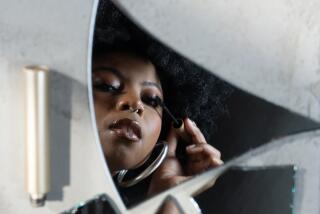In lockdown hair hell? Try these at-home tricks for cuts and covering gray
If you aren’t careful with your hair during the COVID-19 pandemic, your coming days might include having a man bob or a self-inflicted horror haircut or glaring color and extension outgrowth that reveal one too many secrets to your significant other or your colleagues on Zoom video chat.
In search of answers, The Times turned to pro hair colorists and stylists in L.A. to get tips and tricks on how to best tend to hair during quarantine.
One universal piece of advice: Tap into your usual stylist for personalized help and book a post-quarantine appointment now to beat the rush — as recent cancellations at some salons have caused future bookings to back up.
At-home color kits
Many local pros — from Julia Roberts’ hair colorist Kadi Lee of Highbrow Hippie in Venice to Dani Hernandez of Dani H at Sally Hershberger L.A. — are making clients’ custom base colors available to them in the form of at-home kits delivered to their doorsteps. Those kits also come along with FaceTime support. (Hernandez, for example, delivered 20 of his $75 kits on Wednesday alone.)
The emphasis here is on base color, the experts say. Forget about attempting anything more complex like adding highlights at home.
For hair colorist Tracey Cunningham, co-owner of Beverly Hills salon Mèche — whose roster includes Jennifer Lopez, Ellen DeGeneres and Portia de Rossi — the kit concept is nothing new.
“I’ve been sending color kits out to my clients to take on trips or tours since the beginning of time,” she said.
Clients used to bring the base color kit (about $150) to a stylist at their destination, but now with stay-at-home orders in place, they have to apply their color on themselves at home.
“We give them a small brush for the hairline and a big brush for the base and put the color in a little Tupperware bowl so it’s sealed,” Cunningham said. “You mix the peroxide with the color and put it on only at the roots along the hairline and part. Not all over the head.”
At-home coloring tips
Hashtags such as #saveyourroots have been circulating recently on social media in an effort to encourage people to skip buying box kits in support of the hair service industry. However, some people can’t resist wanting to color their hair now, especially after glancing in the mirror at gray locks or unflattering dark roots.
Hairstylist Kiyah Wright tends to the hair of Laverne Cox, Tyra Banks, Jennifer Hudson and Gabrielle Union at her business Muze Suites within Salon Republic in Beverly Hills. She’s on speed dial for color advice.
“The women with the gray hairs [growing in] are the ones freaking out, asking me, ‘What do I do? There’s too much science involved,’ ” she said. “I tell them to go and get Clairol Beautiful Collection.” Clairol’s Semi-Permanent Moisturizing Hair Color is about $8 at sallybeautysupply.com and amazon.com and easy to apply.
“It works on all hair textures and types, and you don’t have to do any mixing,” Wright said. “You just squeeze it straight out of the bottle on the roots or all over and rinse it out in about an hour and a half. It is temporary, light and doesn’t compromise the integrity of the hair.”
Cunningham’s advice is to be careful when it comes to using box color. “I had a bunch of people call me in a panic, saying, ‘Which color do you like the best at Rite Aid?’ ” she said. “Box colors usually end up darker, and most people’s hair is lighter in the front, so we always give everybody a lighter hairline. Buy an extra box in a lighter color for the hairline. Believe it or not, if your hair is a shade too dark, it’s depressing.”

For blond clients who don’t use base color such as DeGeneres (whom Cunningham texted advice to last week), the color guru recommends Malibu C Malibu Blondes Wellness Hair Remedy and the Hard Water Wellness Remedy for all clients ($3.70 per packet, malibuc.com).
Also, despite what other stylists may say, Cunningham eschews color-correcting shampoos. “Purple or gold shampoos just coat hair with color and tend to make it look even more dull,” she said. “And if blondes apply base color to their own hair, they will mess it up so badly. Their hair will go orange.”
Hernandez recommends plant-derived Naturtint Permament Hair Color (about $12, Whole Foods Market and luckyvitamin.com) “for clients who live too far away and need something now to get them through the hump.”
Also, Moroccanoil Color Depositing Masks ($28, moroccanoil.com) offer a temporary wash of camouflaging color while deep-conditioning hair.
“If they feel it’s so crazy that they are wanting to use box color, going darker is a lot easier than going lighter,” said colorist Christine Thompson, co-founder of Spoke & Weal salons. “More people make mistakes trying to lighten a dark base and, when done incorrectly, it can be so difficult to fix.”
She recommends home hair-color maintenance brand DpHue as another option after tracking down a hard-to-find copper hue for a client.
Mark Ferdman, chief marketing officer of DpHue, told The Times that business is up “over 1,065%” since March 19, with 90% being new customers “driven by the Root Touch-Up Kit product, in seven shades.” The kits are available for $30, and the brand is doing a commission split with colorists who place orders through the DpHue Pro app.
Root touch-up powders, sprays and pens
A temporary solution for color outgrowth that all the pros proposed is root touch-up products.
R+Co Bright Shadow Root Touch-Up Spray ($26 in seven colors with a light bergamot-fig-floral scent, randco.com) debuted last month. Oribe Airbrush Root Touch-Up Spray ($32 in six shades, oribe.com) offers UV protection.
L’Oréal Paris Magic Root Precision Temporary Gray Concealer Hair Color Pen ($10.99 in shades of brown and black, lorealparisusa.com and drug stores) allows for targeted brush application.
So does Color Wow Root Cover Up powder ($34.50 in eight hues, colorwowhair.com), a water-resistant, mineral cake powder with a double-sided brush. (Representatives from the brand told The Times that sales in recent days are up 640% compared with the same time last year.)
Chris Appleton, a brand ambassador and hairstylist to Jennifer Lopez and Kim Kardashian West, said, “I simply load the powder up on the small end of the brush and press into the root line. The powder is so natural looking and blends seamlessly with every hair color. It also lasts until you wash it out. I not only use it to cover grays, but you can use it to touch up your highlights.”
Thompson is a fan of root touch-up products. “I’ve been recommending these products for years to clients while traveling, and the color is more important than the brand,” she said. “If hair is really dark brown or black, you can even use a bit of mascara. Some sprays can get messy, so I tend to go for powders, mascaras and crayons that don’t move around as much.”
Braids, weave and extension maintenance
Thompson said clients were rushing in to Spoke & Weal earlier this month to have hair extensions removed. Now those who couldn’t make it are looking for advice on how to remove extensions at home.
“Adhesive-based tape-in extensions usually only last about six to eight weeks. If they get too long, you can get dreading,” Thompson said. “Any kind of alcohol or oil will break down the adhesive. Normally my hack is to use hand sanitizer because it’s gel-based so you can control where it goes. But now, with the shortage, I have clients use coconut oil or even hair spray.”
Wright tells clients to use Walker Tape C-22 Solvent (about $7, His & Her Hair Goods in Los Angeles or amazon.com) to remove extensions. “You just squirt it on and let it sit for maybe 30 seconds, and the tape-in extensions just start sliding out,” she said. “But if you have the bead extensions, you have to get those removed at the salon so you will need to sit it out.”
Kari Williams, owner of natural hair-focused Mahogany Hair Revolution salon in Beverly Hills — whose clients include singers Brandy and Kelis — recommends her Dr. K Comb Out Creme ($24.99, drkariwilliams.com) to help detangle and remove tape-in extensions with minimal breakage.
LeAna McKnight, owner of Stylist Lee Hair Studio in West Hollywood, told The Times that she suggests using a brow blade (found at most drug stores) to carefully detach woven-in hair extensions by “breaking hair free from the threads at the base to prohibit hair damage caused by trying to cut them out.”
Maintenance is key after extension removal as well as for women with braided, twisted and knotted styles that last about two months.
“I am talking to clients about keeping their hair clean and moisturized and protected until they can get back into the salon,” said Williams, who also suggests her Dr. K Daily Spray (also $24.99) to keep hair hydrated. “The men I serve have locks, and they normally wait so see me to shampoo, so I’m also speaking to them about washing hair in the shower or with the help of a significant other. During this time, it’s most important to focus on hair and scalp health. A lot of damage happens when people try to experiment.”
Williams’ go-to for a deep clean to remove oil and product build-up is Paul Mitchell Tea Tree Special Shampoo ($6.50, paulmitchell.com) followed by a moisturizing shampoo and a deep conditioner (cover hair with a shower cap, plastic bag or Saran wrap) for up to 30 minutes. Before hair is completely dry, Williams suggests sealing in moisture with a hair oil such as those by Eden BodyWorks.
“The first thing you need to do — I’m talking about ethnic women with or without hair extensions — is to buy yourself a hood dryer,” said Wright, who also owns the wig and hair extensions business Muze Hair, which she said hasn’t been affected by any delayed shipment of imported hair.
“It is great for a mask treatment, to set your rollers or to dry your weaves” which need to go under the dryer for 45 minutes after a shampoo, she said. “If you don’t want to do too much, put witch hazel or Sea Breeze in an applicator bottle and squeeze it onto the scalp for a fast cleanse.” (Sea Breeze is about $6 and sold at drug stores including Walgreens.)
Texture and styling tricks
Another concern is how to retouch relaxed hair, a chemical salon service that McKnight does not recommend attempting at home. She advises clients use a clarifying shampoo, followed by a moisturizing shampoo.
“After that, extend the curly hair at the roots that has not been chemically treated by slightly pulling it as you blow dry,” McKnight said. “Then go in with a ceramic flat iron on medium heat.”
Infomercial nostalgia, YouTube haircut tutorials and the piercing pain of at-home nose-waxing are at your fingertips.
As for styling solutions to mask hair woes, Williams said, “This is the opportunity to two-strand twist or braid your own hair. And wigs are the savior for women who don’t want to or don’t know how to style their own hair.”
She also suggests using beach sarongs, neck scarves or cute T-shirts as hair wraps. “Tie a couple knots, tuck and roll,“ Williams said. “Or clip-in extensions are great to add fullness and volume to the hair and give it some quick style.”
Cunningham counsels clients to “do two or three little Princess Leia buns or twists on the top of their head” to create natural waves, while deep conditioning and strengthening hair with Olaplex products.
Beverly Hills hairstylist Ashley Streicher, whose clients include Mandy Moore and Sarah Paulson, offers this advice for what not to do. “Pulling your hair back is probably the worst, because it emphasizes any color outgrowth and the line of demarcation,” she said.
Streicher suggests heat-free styles that emphasize natural texture such as loose French braids to “mask split ends or messed-up haircuts” while simultaneously creating tousled waves.
Bang trims
Hairstylists might plead with clients to not attempt at-home cuts right now, but Streicher relents at a bang trim. Her step-by-step tutorial on Instagram advises cutting the hair in strategically divided sections, using a “tiny, sharp scissors” (such as those used to trim cuticles or eyebrows).
“Angle the sides slightly longer to create more of a curtain bang,” she said.
Men’s hair shape-ups
For men looking to trim their shaggy bits of hair, Thompson recommends hair trimmers sold at drug stores. However, handle them with caution.
“Hair usually grows out first around the ears, neck and sideburns so they can clean up around the edges on their own if they want to stay groomed, but I highly recommend using the comb attachment,” she said. “You can make it longer or shorter. Make it longer first, so there is room for error.”
Wright agrees. “Black guys tend to shape up their whole hairline with T-blade edgers, and white boys shape up their sideburns and the hair at the neckline,” she said. “Give yourself a shape-up, including shaving your face and mustache, and you’ll feel like you’ve had a haircut. Guys aren’t so into product, but get some pomade and slick down the sides to give the hair a more tapered look without doing too much.”
Or perhaps let actor Kevin Hart be your hair role model and go for the gray. The actor recently posted a photo of himself on Instagram that revealed his newly salt-and-pepper hair and beard with the caption: “I have always had a ... load of gray hair … I was just a frequent dyer. I’m not working right now so I said ... IT.”
“Embrace the gray, embrace the curls, embrace whatever your natural color is,” Williams said. “Now is the time to really tap in and love on your hair in its current condition. Get to know it.”
More to Read
Sign up for The Wild
We’ll help you find the best places to hike, bike and run, as well as the perfect silent spots for meditation and yoga.
You may occasionally receive promotional content from the Los Angeles Times.











